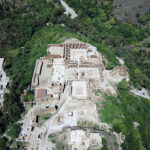ISLAMABAD, July 23 (APP): More than 100 million saplings
will be planted across the country by provincial and federal
forest departments during current monsoon season.
“Climate Change Minister, Zahid Hamid, accorded approval to
the 103.32 million tree sapling plantation target for the monsoon
season at a high-level inter-ministerial and inter-provincial
meeting held at the Ministry’s committee room,” said Mohammad
Saleem, the Climate Change Ministry media spokesperson.
The Climate Change Minister chaired the meeting, which was
held to deliberate upon targets put forward by provincial and
federal forest departments, ministry of defence, Heavy Industries
Taxila, Capital Development Authority, Islamabad Capital Territory
and non-governmental organisations.
The spokesperson said the Climate Change Minister directed
representatives of forest departments, CDA, ICT and other departments
to utilize all possible resource at hand to achieve the tree
plantation target.
The 12 million tree would be planted by Punjab forest
department in the province during this monsoon season, Khyber-
Pakhtunkhwa will plant 70 million trees, Sindh 14 million trees,
Baluchistan 7,50,000 trees, Azad Jammu and Kashmir 3.75 million
trees, FATA 1.01 million trees, Ministry of Defence one million
trees, Heavy Industries Texila 1,000 trees, Pakistan Ordnance
Factory 4,000 trees and IUCN 500,000 trees.
He said the present government is committed to boosting
country’s forest cover. For this purpose, all provincial and
federal government organisations, educational institutions,
corporate sector, NGOs and media were being approached and
engaged to join the government’s efforts for re-invigorating
the country’s ailing forest sector.
The forests are the best way to cope with various deleterious
socio-economic, environmental and health fallouts of global warming-
triggered climate change, particularly floods, decertification, wind
erosion, storm-rains and heavy winds, cyclones, sea intrusion,
glacial melt, erratic and torrential rain.
He said the forests hold back floodwater by nearly 72 hours
and; hence, reduce intensity of the deluge water, lower chances of
deaths and damages to roads, building infrastructures, bridges as
well as standing crops from being washed away or wiped out,” he
added.
Over 100 million saplings plantation target set for ongoing monsoon







